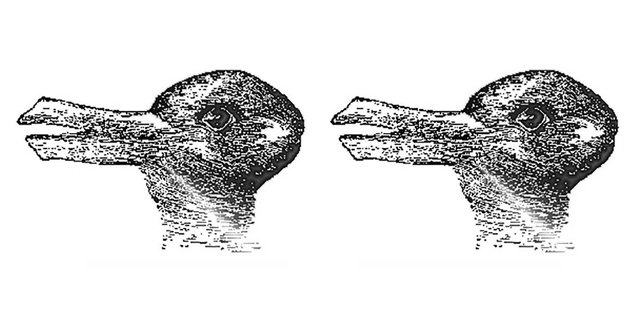Manipulating Perception With Words
Optical illusions can show us how perception and interpretation of what we perceive can be used to show different things at the same time. Multiple layers are contained at once, ready to be deciphered.
You might've already seen this image before. What do you see? Are you looking at:
- two ducks?
- two rabbits?
- a duck and a rabbit?
- or maybe a duck eating a rabbit?
That last one is a bit weird to think of, but maybe that's what you see ;)
It turns out that looking at two ambiguous figures and trying to interpret them differently at the same time doesn't happen upon our first glance. It takes a bit of effort. Suggesting that there is a duck is eating the rabbit, helps people who can't see a duck and rabbit at the same time, to be able to do so.
It's important how the phrase is constructed. "Duck eats rabbit" gives the brain a context to distinguish two identical images, but saying "next to" or "beside", as in the "duck being next to the rabbit", or the "duck beside the rabbit", does not have the same effect. The reason is because it doesn't explain which images the duck is and which is the rabbit. By saying the "duck eats the rabbit", your providing an order to which one is where based on how the image is constructed.
By disambiguating the scene and telling the brain how to interpret the information with just a few words, people can make you interpret and understand something the way they want you to see it. This trick can be applied to any information, such as the news we receive on television, online, or in newspapers.
We can be manipulated into seeing things a certain way with the ordering and construction of words. That's powerful.
Sources:
http://journals.sagepub.com/doi/10.1177/0301006618756810
http://news.academicjournals.info/?p=1723
